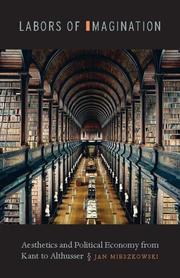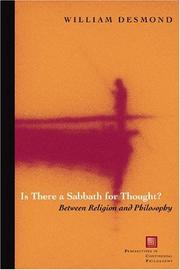| Listing 1 - 10 of 45 | << page >> |
Sort by
|

ISBN: 0823225879 9780823225873 0823248062 0823225895 0823235343 1429478950 0823246434 0823226034 0823226050 0823240924 1429478969 Year: 2006 Publisher: New York Fordham University Press
Abstract | Keywords | Export | Availability | Bookmark
 Loading...
Loading...Choose an application
- Reference Manager
- EndNote
- RefWorks (Direct export to RefWorks)
Challenging various assumptions about the relationship between language and politics, this book offers an account of aesthetic and economic thought since the eighteenth century. Providing a contribution to contemporary debates about culture and ideology, it is suitable for scholars of literature, history, and political theory.
Philosophy. --- Political science --- Economics. --- Aesthetics. --- Paris (France) --- France --- History --- Politics and government
Book
ISBN: 9780823251322 9780823251339 Year: 2013 Publisher: New York Fordham University Press
Abstract | Keywords | Export | Availability | Bookmark
 Loading...
Loading...Choose an application
- Reference Manager
- EndNote
- RefWorks (Direct export to RefWorks)
Antigone (Greek mythology) in literature --- Greek drama (Tragedy) --- Antigone (Mythologie grecque) dans la littérature --- Tragédie grecque --- History and criticism. --- Histoire et critique --- Sophocles. --- Antigone (Mythologie grecque) dans la littérature --- Tragédie grecque --- Antigone --- In literature.
Book
ISBN: 9780823263295 Year: 2015 Volume: *2 Publisher: New York Fordham University Press
Abstract | Keywords | Export | Availability | Bookmark
 Loading...
Loading...Choose an application
- Reference Manager
- EndNote
- RefWorks (Direct export to RefWorks)

ISBN: 9780823223732 Year: 2005 Publisher: New York Fordham University press
Abstract | Keywords | Export | Availability | Bookmark
 Loading...
Loading...Choose an application
- Reference Manager
- EndNote
- RefWorks (Direct export to RefWorks)
Book
ISBN: 9780823251919 Year: 2013 Publisher: New York Fordham University Press
Abstract | Keywords | Export | Availability | Bookmark
 Loading...
Loading...Choose an application
- Reference Manager
- EndNote
- RefWorks (Direct export to RefWorks)
Book
Abstract | Keywords | Export | Availability | Bookmark
 Loading...
Loading...Choose an application
- Reference Manager
- EndNote
- RefWorks (Direct export to RefWorks)
Periodical
Year: 2017 Publisher: New York Fordham University Press
Abstract | Keywords | Export | Availability | Bookmark
 Loading...
Loading...Choose an application
- Reference Manager
- EndNote
- RefWorks (Direct export to RefWorks)
Book
Year: 2012 Publisher: New York Fordham University Press
Abstract | Keywords | Export | Availability | Bookmark
 Loading...
Loading...Choose an application
- Reference Manager
- EndNote
- RefWorks (Direct export to RefWorks)
Book
ISBN: 9780823262182 Year: 2014 Publisher: New York Fordham University Press
Abstract | Keywords | Export | Availability | Bookmark
 Loading...
Loading...Choose an application
- Reference Manager
- EndNote
- RefWorks (Direct export to RefWorks)
The Feminine Symptom is a deconstructive, psychoanalytic, continental feminist study of Aristotle’s natural philosophy. It proposes that Aristotle’s theory of sexual reproduction is key to understanding his philosophical project as a whole. Just as a craftsman creates an artifact, the male supplies the form, which acts on matter provided by the female. The “feminine symptom” refers to the mechanism by which a female offspring is produced, namely a fault or misstep in the teleological unfolding of reproduction, occasioned by the presence of chance forces, but one that is necessary to the teleological cosmos. The book repositions Generation of Animals as the central text of Aristotle’s thinking, and traces the aleatory feminine symptom as accident, chance, coincidence and necessity operating in Aristotelian metaphysics and physics: in cause, place, motion, potentiality, and actuality, as well as exploring the relationship of Aristotle’s natural philosophy to Plato, atomism, and other predecessors. The methodology attends to Aristotle’s figures, his literariness and teleological momentum, seeking out textual aporias, slippages, and symptoms in relation to sexual difference. The analysis reveals the dual vectors at work in Aristotle’s thought: a movement toward system-building, hierarchy, and teleology, but also a phenomenological attunement to the singularity of things. The book engages Heidegger’s reading of Aristotle, and remedies the lack of attention paid to Aristotle by 20th-century French thinkers, and also addresses an Anglophone literature on Aristotle’s biology and feminism. The book develops a politics of “aleatory feminism” that converges with the contemporary turn to “new materialisms” in the theoretical humanities.
Multi
ISBN: 9780823263318 9780823263295 Year: 2015 Publisher: New York Fordham University Press
Abstract | Keywords | Export | Availability | Bookmark
 Loading...
Loading...Choose an application
- Reference Manager
- EndNote
- RefWorks (Direct export to RefWorks)
| Listing 1 - 10 of 45 | << page >> |
Sort by
|

 Search
Search Feedback
Feedback About UniCat
About UniCat  Help
Help News
News